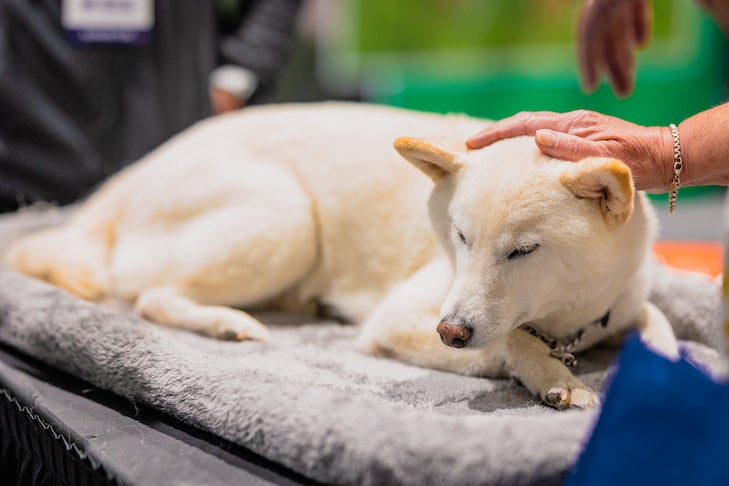Our pets provide so much happiness, love, retreat, and even peace in our lives. So, when we see our dog, cat, or any other animal friend suffering — be it from anxiety, old age, or illness — we’re willing to do anything to provide that comfort and relief to them.
Reiki has provided a path to healing for many people who are coping with mental, physical, and spiritual difficulties. It’s an energy-based Japanese holistic method applied through noninvasive, nonmanipulative gentle touch that dates back to the 1900s. Today Reiki is practiced all over the world and seems to be gaining popularity by the minute. So naturally, if it’s good enough for people, we can’t help but wonder if it could also benefit our pets? But before we get to that…
What Exactly Is Reiki?
If you speak to a Reiki expert and simply ask the question, “What is Reiki?“, you will most likely get an answer along the lines of, “What isn’t Reiki?“. According to practicing Reiki Masters, including Kathleen Prasad of Animal Reiki Source, author and the creator of the Let Animals Lead Method, “We are all Reiki, everything is Reiki.” The translation of the word is made up of two Japanese words put together. Rei, which means spirit, and Ki, which means energy, so it directly translates to “spiritual energy”. “That spiritual energy makes up everything in the universe,” says Prasad.
“We all have Reiki within us,” says Jeanne Clune, CPDT-KA Behavior Consultant at Behavior Vets NYC, Fear Free Certified Trainer and Let Animals Lead Reiki Teacher. “I’m not going to go to a Reiki master and have them put it in me. We are all born with spiritual energy, it’s the essence, it’s the innocence within us.”
The system of Reiki — that being the practice of Reiki to heal and treat — provides hands-on natural healing through touch when applied from one living thing to another. “Different mediation tools including symbols and mantras and breathing and visualization practices help to create the necessary environment,” says Prasad. In practice, Reiki utilizes the meditative space provided by the healer to the individual to connect and offer calm. This transfer of energy has been known to help individuals either better cope with or move past emotional and physical pain.

So How Can Reiki Help My Pet?
Reiki is steadily gaining popularity in the animal world as a complementary health therapy. In fact the NCBI has even found through studies that, “Reiki is a safe and gentle “complementary” therapy that activates the parasympathetic nervous system to heal body and mind. It has potential for broader use in management of chronic health conditions, and possibly in postoperative recovery.” Specifically, Reiki is being used as a treatment and connection method in a number of ways for pets including:
Anxious or Stressed Pets
“The number one primary benefit and response to Reiki with animals is stress relief and deep relaxation,” says Prasad”. The calm space created by a Reiki practitioner’s meditation invites the animal to join that relaxed environment. This can make Reiki an effective stress reliever for pets in high anxiety environments, be that a shelter setting or even at home with a new baby in the house.
Coping With Illness and Surgery Recovery
When we are deeply relaxed, all of our systems relax and can function optimally and our immune system can operate more optimally. “Our bodies can heal themselves when we can allow ourselves to relax,” explains Prasad. Reiki works by inducing that state or creating that relaxation that we need to heal ourselves. “I have seen animals who are sick for a long time and they get better more quickly or heal after surgery quickly with the help of Reiki.”
Reiki can also be helpful throughout the medical process. If you have a pet who is anxious at the vet, but requires many visits because of their sickness or needs surgery, Reiki can help prepare them. Clune shares how Reiki can help put a pet more at ease prior to walking into those situations.
End of Life Care
Reiki is offered in many hospitals and hospices for both family members and patients. When Reiki is used to help an animal pass, we find similar benefits. “Animals handle death better than we do,” says Clune. “They know they are dying, they need time to process this and to know they are leaving.” Reiki can help provide that time so that a pet is not in severe pain as they cope with this impending change. It can also bring pet owners some peace as well, especially knowing that their pet is at peace — maybe eating more and being more playful in their final days — and ready to say goodbye.
“Reiki can create this beautiful peacefulness in the dying process, sometimes it’s not about getting better, but it’s about finding peace,” says Prasad. It can be an incredible gift to have in a difficult moment.
Bonding and Quality Time
Reiki can provide a way to strengthen the human-pet connection. “Animals teach us, they share with us even more than we share with them. They are intuitive beings,” says Clune. Reiki can offer another way to connect with your pet and can be especially helpful if you have rescued a new pet with past trauma or notice significant changes in your pet’s demeanor, but there are no physical signs of illness.

The “Let Animals Lead” Philosophy
“As a behavior consultant, we have learned that force-free methods and positive reinforcement offer the best ways to work with dogs with past behavior issues,” says Clune. That is why Prasad’s Let Animals Lead method is so useful when practicing Reiki with pets. You can create a space for a pet to join you in peace and calm, but if they are not willing or interested, it is okay. “When an animal says no, if they are aggravated, or don’t feel like it right now it is important to give them the choice and let them decide when,” says Prasad.
“I have only had one animal who didn’t want Reiki,” shares Clune. This dog had been having trouble in playgroups and seemed anxious around other dogs. “We took a walk [to an enclosed area], once inside he was pacing, he was running the perimeter. I sat and I was sharing space, and he wanted to go out of the gate. He was very nervous being contained. He had a reason not to want to be contained. So, I started bringing him off the property and we went on walks in the woods on long-lines. Eventually [in these physically open environments] he loved Reiki, so much so he would fall asleep with me. Today he is dog selective, but he does like other dogs and can be around them.
How to Practice Reiki At Home
While you can easily find a Reiki Master who professionally works with pets in your area, you may want to give it a go yourself. If you find you enjoy it, you can even train to become a Reiki certified practitioner and work with other pets too.
When practicing Reiki at home, you’re learning how to shift into more balance and more peacefulness for both your own benefit and your pet’s. “We are all connected, all one, and how do you tap into that? Reiki is the key that unlocks the door,” says Prasad. Prasad says there are many collections of mediations that you can do with your pets right now. Their purpose is to help you connect heart to heart. “It’s not that difficult, create a space and hold space for your pet.” It can be that simple.
Are Virtual Reiki Sessions Worthwhile?
In today’s virtual world, it’s a natural question to ask. Can Reiki work in virtual settings? Given Reiki is based on the transfer and sharing of energy, the simple answer is: Yes. “We are all made of energy and while perception tells us we are separate, the philosophy of energy is that we are all connected,” says Prasad. In fact virtual reiki sessions may even be preferred in some circumstances. For instance, if a pet is fearful of new people or places, a virtual Reiki session may be the way to go. And Clune notes that cats, in particular, seem to respond better virtually to Reiki.
How Do You Know If Reiki Is Working?
Essentially any signs of relaxation or connection can signal that Reiki is positively impacting an animal. An animal may lay down or fall asleep and dream. “Some high-strung animals that are busy, won’t entirely relax. They’ll still do their thing, but come back and check in on you,” notes Prasad.
There is ongoing research to help determine whether there is evidence that Reiki provides more than just a placebo effect.
Reiki in Animal Shelters
Given the power Reiki has to bring peace and calm, it’s no wonder that it is becoming an enrichment offering in shelters across the world. Prasad co-founded the Shelter Animal Reiki Association (SARA) in 2008. This non-profit now has over 200 members and helps dozens of sanctuaries and rescues in the US, Canada, Europe, and India.
Clune is a part of a group that visits shelters in person and virtually once a month. “When a shelter closes for the night, all of the dogs typically bark and the cats hide. We sit quietly and start to meditate together in a circle and the dogs start to come up to their gates and fall asleep.” Not only can it bring relaxation to pets in these high anxiety environments, but it can also help rescue animals who experienced past trauma gain more confidence. Which can ultimately help them get rescued.
As Prasad puts it, “Reiki touches the spirit and then the spirit ripples out to the mind and body. We are creating a spiritual healing.” So it seems that no matter what goal you hope to achieve, Reiki can offer a harmless path to peace and healing for not only yourself, but your pet too.
This article is intended solely as general guidance, and does not constitute health or other professional advice. Individual situations and applicable laws vary by jurisdiction, and you are encouraged to obtain appropriate advice from qualified professionals in the applicable jurisdictions. We make no representations or warranties concerning any course of action taken by any person following or otherwise using the information offered or provided in this article, including any such information associated with and provided in connection with third-party products, and we will not be liable for any direct, indirect, consequential, special, exemplary or other damages that may result, including but not limited to economic loss, injury, illness or death.

